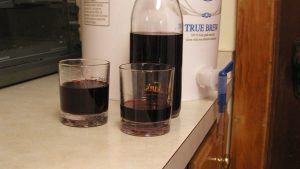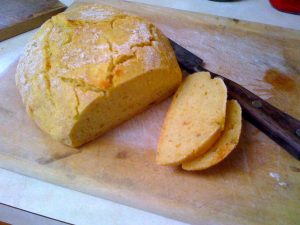Ever since learning about no-knead artisan bread making, I have been baking bread – all sorts of bread. I’ve made 100% whole wheat, dense and chewy. I’ve made high-gluten white, with large holes and a nice crust. I’ve added things to my bread: flax and chia seeds, cracked wheat. I’ve made cinnamon raisin bread, kalamata olive, parmesan cheese bread, sundried tomato bread, cornmeal and hot pepper bread, oatmeal bread. All these breads use essentially the same process and the same proportion of the basic ingredients: 3 cups of flour or a mix of grains and flour, 1.5 cups of water, salt, yeast, and whatever else I want to put into it.
But this process of making bread has also taught me something about myself – who I am and what my personality is like. I have discovered, and confirmed, that, generally, I do not approach things in a scientific way, in the way a researcher would. That is perhaps surprising, given that my educational trajectory was in math and science. I love math and science, but I struggle with the expectation to conduct research. I am not sure I am cut out to do research.
I thought about research and me in relation to the baking of bread when I heard an interview on NPR with the author of “52 Loaves”. This person approached baking bread as a research project. Things got very technical. I discussed baking bread with an acquaintance of mine who also bakes his own bread. Again, things were quite technical – for example, ingredients were measured, precisely, by weight. I don’t bake bread that way. By the way, neither does the person who introduced me to the no-knead bread baking process. I know the basic proportions. And I know, approximately, what consistency the dough ought to be. So I start out with, approximately, 3 cups of flour or other combinations of grain – whatever I happen to have on hand that interests me that day. I dip my half cup measure into the jar and pull up a half cup, more or less. It doesn’t really matter how precise because then I will add my liquid, as much as needed, 1.5 cups, more or less, until I get the consistency I want. Different combinations of flour require different amounts of liquid. I’ve experienced that. If I use some oatmeal, I will need to use less liquid than if I use all high gluten white bread flour. But, how much less? I don’t know. I didn’t write that down. I certainly do experiment, but not in any scientific way. None of my bread is really reproducible. I can tell you, generally, what I do, but I cannot tell you exactly what I do.
 There are other things I do in this same manner. I’ve knit items, making up the pattern as I go along. But do I ever write down what I’m doing? When I cook, I rarely follow a recipe, and when I do, I usually only use it as a general guide, and not as a prescription. And, unfortunately, we have not kept any records of our wine making endeavors. The wine we named Pete’s Deep Red was perhaps our best wine. But what did we do? Now I can’t remember. How did we extract the juice? Sometimes we’ve used sugar, sometimes honey, sometimes even maple syrup. What did we use for that batch? How many times did we rack? How long did we let the wine sit before bottling? Did we use oak chips or not? Can we ever make that wine again? Probably not.
There are other things I do in this same manner. I’ve knit items, making up the pattern as I go along. But do I ever write down what I’m doing? When I cook, I rarely follow a recipe, and when I do, I usually only use it as a general guide, and not as a prescription. And, unfortunately, we have not kept any records of our wine making endeavors. The wine we named Pete’s Deep Red was perhaps our best wine. But what did we do? Now I can’t remember. How did we extract the juice? Sometimes we’ve used sugar, sometimes honey, sometimes even maple syrup. What did we use for that batch? How many times did we rack? How long did we let the wine sit before bottling? Did we use oak chips or not? Can we ever make that wine again? Probably not.
There are those who do keep records and sometimes I wish I were more like that. But I am not. So life is an adventure, ever changing, never sure.

